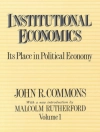As the state withdraws from welfare provision, the mixed economy of welfare – involving private, voluntary and informal sectors – has become ever more important. This second edition of Powell’s acclaimed textbook on the subject brings together a wealth of respected contributors. New features of this revised edition include:
• An updated perspective on the mixed economy of welfare (MEW) and social division of welfare (SDW) in the context of UK Coalition and Conservative governments
• A conceptual framework that links the MEW and SDW with debates on topics of major current interest such as ‘Open Public Services’, ‘Big Society’, Any Qualified Provider’, Private Finance Initiative (PFI) and ‘Public Private Partnerships’ (PPP)
Containing helpful features such as summaries, questions for discussion, further reading suggestions and electronic resources, this will be a valuable introductory resource for students of social policy, social welfare and social work at both undergraduate and postgraduate level.
Tabla de materias
Introduction: the mixed economy of welfare and the social division of welfare ~ Martin Powell
The mixed economy of welfare in historical context ~ John Stewart
The state ~ Brian Lund
Market welfare ~ Robin Miller
Voluntary and community welfare ~ Rob Macmillan and James Rees
Informal welfare ~ Martin Powell
The benefits and inequalities of fiscal welfare ~ Adrian Sinfield
Occupational welfare ~ Edward Brunsdon and Margaret May
The mixed economy of welfare: a comparative perspective ~ Michael Hill
Conclusion: analyses in the mixed economy of welfare and the social division of welfare ~ Martin Powell
Sobre el autor
Martin Powell is a Professor of Health and Social Policy at the University of Birmingham. Martin’s main research interest is in the British welfare state, especially the NHS. He has written or edited some 19 books, including some being translated into Chinese, Korean, and Polish. He has written over 80 peer reviewed articles, and he is a former editor of the journal ‘Social Policy and Administration’.












